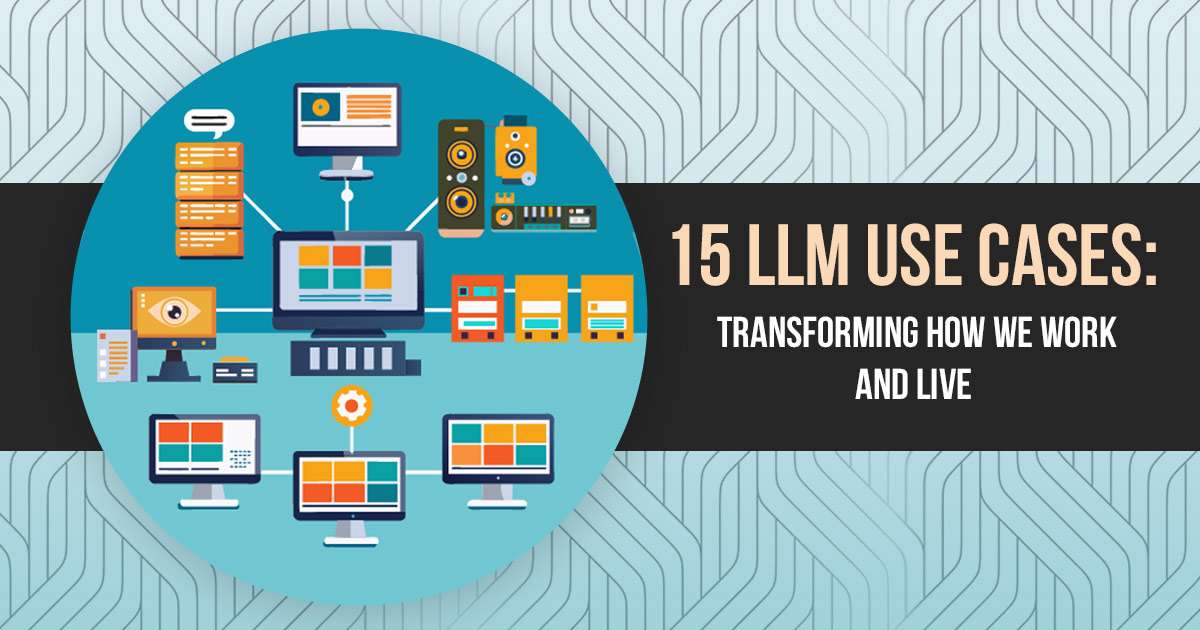15 LLM Use Cases: Transforming How We Work and Live

Large Language Models (LLMs) have become essential tools in many fields, changing how we work and communicate. These models are capable of understanding and producing text that is similar to human writing. Explore 15 LLM use cases that show how these models are making a difference across various industries. By the end, you’ll have a clear idea of the large language models’ use cases and how they can benefit you or your business.
What is an LLM?
Large Language Models (LLMs) are sophisticated tools for understanding and creating human language on a massive scale. They use complex algorithms to process text, making them similar to how humans think. The global LLM market is expected to grow from $1.59 billion in 2023 to $25.98 billion by 2030, with a compound annual growth rate (CAGR) of 79.80% during this time.
LLMs work like the human brain, using neural networks to learn. They are trained using huge quantities of text data, which allows them to learn linguistic intricacies. One important ability they learn is guessing the next word in a phrase. With this ability, LLMs can understand context and generate meaningful responses.
LLMs have changed how we find and share information, communicate, and express creativity. As they have evolved from simpler models to more advanced systems like GPT-4, they can now do more than just process text. Here are some ways LLMs are being used:
- Versatility of Applications: LLMs can handle a wide range of tasks, such as generating and summarizing text. They can also be used in fields like healthcare and law.
- Boosting Human Productivity: LLMs help save time by simplifying tasks like content creation, coding, data analysis, and research. This allows people to focus more on creative and strategic thinking instead of repetitive tasks.
- Accessibility: LLMs make it easier to turn large amounts of data into useful information, helping users find insights more easily.
- Interactivity at Scale: LLMs are great for creating interactive tools, leading to the development of advanced chatbots, virtual assistants, and educational applications. These tools use LLMs to offer personalized and engaging experiences.
Top LLM Use Cases
Large Language Models (LLMs) are changing the way we interact with digital content and transforming customer service. They are reshaping how businesses operate and influencing our daily lives. Here are some of the top LLM use cases and applications:
1. Customer Support Automation
One of the most common applications of LLMs is in customer support. Companies are employing LLMs to build chatbots that can respond to client questions at any time. These chatbots can handle many inquiries and solve simple problems quickly, which helps businesses save money and improve service.
Example:
Many businesses use LLM-powered chatbots to assist customers with order tracking or answering frequently asked questions.
2. Content Creation
LLMs can assist with the creation of several types of content, including blog entries, product descriptions, and social media updates. They analyze trends and understand what audiences want, which allows them to generate high-quality content quickly. This is extremely helpful to marketers and content developers.
Example:
A company might use an LLM to write product descriptions that appeal to customers, saving time and effort.
3. Language Translation
Another important LLM use case is language translation. These models help to translate text between languages, making communication easier for people all around the world. They use grammar and context to give reliable translations.
Example:
Google Translate is a popular service that employs LLMs to deliver real-time translations in a variety of languages.
4. Healthcare Support and Diagnosis
In healthcare, LLMs can help doctors diagnose patients. They analyze large amounts of medical information and patient data to suggest possible conditions and treatments.
Example:
LLMs assist doctors better comprehend patient symptoms and make advice based on previous cases.
5. Code Generation and Programming Assistance
LLMs are also valuable for software developers. As one of the Large Language Models’ use cases, they can generate code snippets, suggest improvements, and help debug errors, making the coding process faster and more efficient.
Example:
Tools like GitHub Copilot use LLMs to provide coding suggestions in real time.
6. Sentiment Analysis
Businesses utilize LLMs for sentiment analysis, which helps them learn how customers perceive their products or services. By analyzing reviews and social media posts, LLMs can identify positive or negative sentiments.
Example:
E-commerce sites analyze customer feedback with LLMs to improve their offerings based on what customers think.
7. Legal Document Review
In the legal field, LLMs help review documents by identifying important information and potential issues. This makes the review process faster and less prone to human error.
Example:
Law firms can use LLMs to quickly analyze contracts and other legal documents.
8. Personalized Learning
Education technology is another area where LLMs are making a big impact. They can customize learning experiences based on a student’s performance, helping them learn more effectively.
Example:
LLMs may be used by online learning platforms to tailor lectures to each student’s specific needs, hence improving learning outcomes.
9. Search Engine Optimization (SEO)
LLMs assist marketers with optimizing their content for search engines. By analyzing keywords and user behavior, LLMs can suggest ways to improve content visibility online.
Example:
SEO tools powered by LLMs suggest keywords and topics that can help increase a website’s ranking on search engines.
10. Fraud Detection
LLMs are used in finance to detect fraud by examining transaction patterns. They can identify suspicious activity quickly, helping to protect businesses and consumers.
Example:
Banks employ LLMs to monitor transactions for odd activity that could suggest fraud.
11. Virtual Assistants for Developers
LLMs support developers by assisting with coding questions and challenges. They can provide explanations and solutions in real time, streamlining the development process.
Example:
Developers can ask an LLM-powered virtual assistant for help with specific programming issues.
12. Social Media Management
Managing social media accounts can be overwhelming, but LLMs help automate many tasks. They can make posts, respond to comments, and track engagement numbers.
Example:
Social media tools employ LLMs to automatically schedule content and communicate with followers.
13. Text Summarization
LLMs excel at summarizing large amounts of text. They can read long documents and highlight key points, making it easier for people to digest information.
Example:
Journalists use LLMs to summarize reports, allowing them to focus on the most important details.
14. Voice Recognition and Transcription
LLMs improve voice recognition technology, making transcription more accurate. They can translate spoken words into text, which is important in meetings and interviews.
Example:
Transcription services use LLMs to provide real-time text during meetings.
15. Creative Writing and Storytelling
LLMs are being used in creative writing. They help authors brainstorm ideas, develop plots, and even write entire stories.
Example:
Writers can employ LLMs to overcome writer’s block and get ideas for their work.
The Impact of LLMs on Business and Everyday Life
The diverse LLM use cases demonstrate the powerful impact of large language models across various industries. From automating customer support to assisting in creative writing, these models are enhancing productivity and innovation.
Understanding and implementing the various applications of LLMs can lead to better efficiency and problem-solving in your business or personal projects. As technology advances, the potential for LLMs will only increase, opening up fascinating new options for the future.
By recognizing the wide range of LLM usage, you can harness these tools to drive success in your industry and improve everyday tasks.

